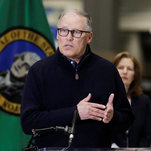
“If you don’t speak out, if you are afraid of somehow incurring the wrath of this guy, then I think you’re failing in your duty to the people who elected you.
Still, emergencies have long created tensions between federal, state and local officials. Politicians and analysts said there were added challenges now given the scope of the pandemic and the depths of the nation’s political divides.
“I’d say there’s always a dance between any governor and sitting administration in knowing that you have to draw between the lines and look for ways of working constructively with that administration regardless of your party,” said Mark Sanford, the former South Carolina governor and Republican congressman, who lost his seat in Congress after Mr. Trump endorsed his primary opponent.
That said, he added: “This president’s a bit of an outlier as it relates to a perceived slight or the perception of loyalty, and who seems to think things in remarkably personal terms, whether slight was meant, or regardless of intent.”
For now, facing the prospect of a brutal few weeks, many governors are arguing for a more aggressive national approach and doing what they can in their own states.
Ms. Whitmer, the Michigan governor, contended that a more stringent response now could help contain the pandemic, even if it means sharper immediate economic pain.
“The shorter we make it,” she said, “the better for our health and the better for our economy.”
Mike Baker, Ana Swanson and Katie Thomas contributed reporting.